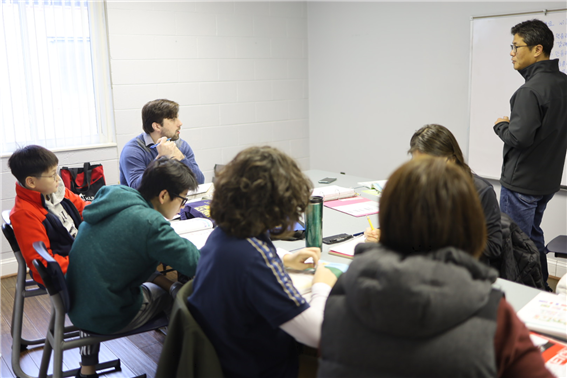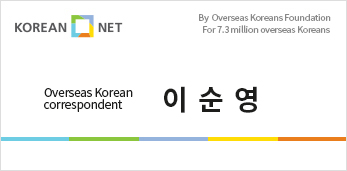Overseas Koreans Platform
- Main page
- Overseas Koreans Platform
- News Room
News Room
- Main page
- Overseas Koreans Platform
- News Room
- Country
- United States
- Date
- 2022.12.22
The school initiates classroom observation in October, the month with Hangeul Day.
Korea’s Foundation Day and Hangeul Day are both in October. For Koreans living abroad, Korean language is something more than just a tool for communication; it is an aggregate of their ethnic identity, culture, and spirit. That is why October is such an important month for Korean Schools in charge of teaching Korean language to those living overseas. Teaching Korean language to children is to build up their pride and identity as Korean people, allowing them to live their lives with Korean identity as their mental foundation. Of course, language is the focal point in ethnic education for all groups as well as those living overseas. But, the ones living abroad would feel its necessity the most as they are surrounded with different cultures, languages and sentiments.
Language education lies at the center of ethnic education. Fifth-graders taking a class
According to the Talmud, the Hebrew leader Moses was taken away from his birth mother to be adopted by the royal family of Egypt, growing up as an Egyptian prince. But the nanny who was in charge of raising him was no other than his mother of birth. His mother was so passionate about teaching the Hebrew spirit and language that she even drew a map of Hebrew when she breastfed her son. It would not be an overstatement to say that Moses became the hero of his people under suffering despite growing up as a well-off Egyptian prince because of his mother’s teachings. That is why Jochebed, the mother of Moses, is still considered as an educational role model for Jewish mothers to this day. The story shows that identity education has a crucial value that must be protected even in dire situations that require immense effort and sacrifice. One good example would be Koreans, who did everything they could to keep our language and alphabet system intact even under the rule of Japanese imperialists.
However, protecting one's mother tongue living overseas is not easy. Some might think Korean children would easily learn how to speak Korean, but the matter is far more complicated than that. The fact that many Koreans who immigrated to other countries lost their ability to speak Korean when they moved overseas in their middle and high school years as fluent Korean speakers proves that language has a characteristic of eventually being lost when not used. Some might wonder how such a thing could happen, but that is the reality. For overseas Korean children to learn their mother language, Korean language education is an absolute necessity.
Detroit Korean School, Leading the Way for the Local Community’s Korean Education
Fortunately, here in Michigan of the United States, the Detroit Korean School is leading the way as an educational institute for Korean students. The school is run independently by the Korean United Methodist Church, providing education for children of non-believers of the church who require Korean language education as well as those with faith. Hangeul was first taught in the school in 1977 by teachers Ahn Young-sook, Shin Tae-soon, and Seo Gyeong-sook, and in 2022 the school has 190 students enrolled, continuing its legacy as a crucial institution of the Korean community that provides lessons for Korean culture and history as well as language.
The English version of the ‘Korean Language for Overseas Koreans,’ which was published by the Ministry of Education and the National Institute for International Education, is used as Detroit Korean School’s textbook, along with independent curriculum prepared by each teacher. The classes and school systems are arranged in a way that provides customized education for each grade that ranges from pre-school to high school. Furthermore, the school provides Korean lessons according to the student’s level with special classes for second-generation Koreans who lack Korean language skills and non-Koreans who wish to learn Korean.
Detroit Korean School shines with such history and traditions, and on Sunday, October 30, the classroom observation for parents was held. It has been only two months since the start of the new semester for 2022–2023, but the school prepared a session for parents to observe the classes. The parents who participated could feel the atmosphere of the class and witness the class materials being taught first-hand in an actual teaching environment. Although the classes are run only once a week, the parents could see the passion of the 30 teachers and voluntary students through the earnest faces of students in their lessons. An interesting fact was that the school had voluntary students in each class to help out with lessons. Students who studied two years or longer are eligible for educational volunteering when they enter high school. They help the teachers and contribute to making the learning environment of the class more stable. The process of positive feedback where students who learned Korean in school grew up to provide aid to younger children is impressive.
On October 30, Detroit Korean School invited parents for classroom observation.
The classroom observation in Detroit Korean School was a precious chance for teachers, students, and parents to all relate to the language of Korea and share their love, attention, and encouragement for one another. I truly hope for more opportunities for students in overseas Korean communities to share positive values empowering their inner strength.

Detroit Korean School has classes according to the Korean language level of students
A chance for teachers, students, and parents to all gather as one with common ground of Korean language
Parents watching their children from the back of the classroom
Students experiencing more stable Korean lessons thanks to the participation of volunteer students
